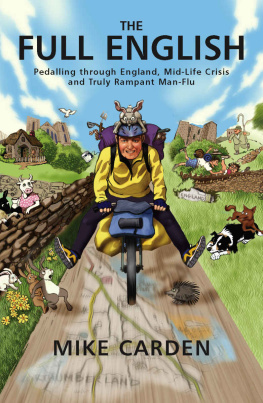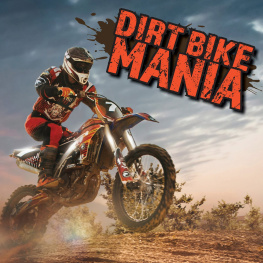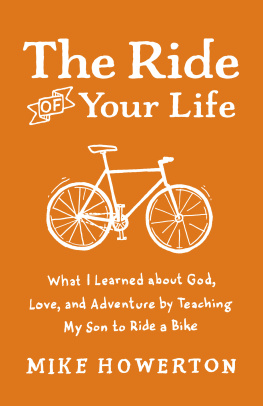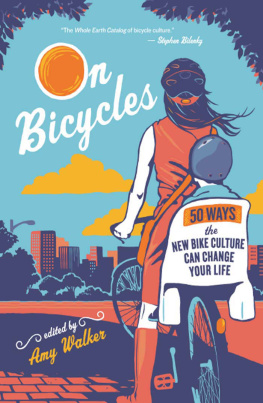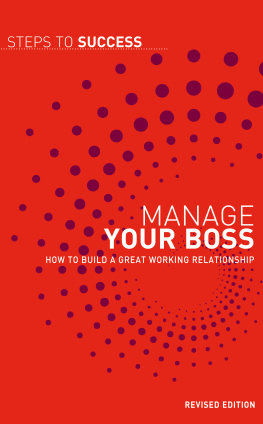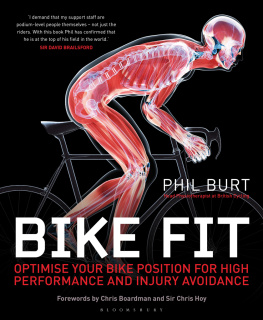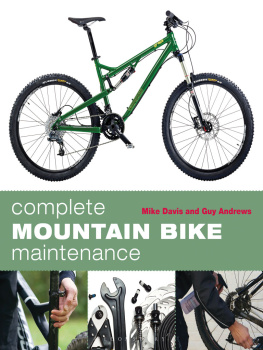THE FULL ENGLISH
Pedalling through England, Mid-Life Crisis
and
Truly Rampant Man-Flu
Mike Carden
Published by
Bike Ride Books
www.bikeridebooks.co.uk
The Full English Michael Carden, 2007
The right of Michael Carden to be identified as the author of this book has been asserted by him in accordance with the Copyright, Designs & Patents Act, 1988
This book is sold subject to the condition that it shall not, by way of trade or otherwise, be lent, re-sold, or otherwise circulated without the publishers prior consent in any form of binding or cover other than in which it is published and without a similar condition including this
condition being imposed on the subsequent purchaser.
First published in Great Britain in 2007 by Bike Ride Books
Reprinted in 2008 and 2009
Cover illustration by Robin Grenville-Evans
ISBN 978-0-9556602-0-7
Bike Ride Books
6 Stuart Way, Bridport, Dorset, Great Britain
The Full English
A delightfully tongue in cheek trip through England - past and present. Along the way youll find out about: Terry - Druid Keeper of the Stones, wartime secrets of the Gurkhas, the Society For The Prevention Of Getting Lost In The English Countryside, and much more.
Richard Peace, cycling journalist and author of the Excellent Books range of cycle guides
Mike's relaxed and chatty style is never less than entertaining, making The Full English the sort of book that can put a smile on your face even when it is cold, grey Winter outside.
Dorset County Magazine
An easily read book, humorous, well written and full of the eccentricities of the English.
Arrive
Cardens witty dialogue, his casual banter with Scott the bike, which should seem peculiar but strangely isnt, and his calm sarcasm in the face of the great English eccentricities makes this a joyful read that will sweep away the dark nights of winter and conjure up memories of summer days in the countryside.
www.TheHistoryMagazine.co.uk
Beginning
A s I stood on the edge of the low cliffs holding on to the bike, the sea below was surging past the rocks, breaking and foaming. Behind me, the red-and-white striped lighthouse marked the southernmost tip of Dorset in the centre of the south coast of England Portland Bill.
Wisely, I feel now, I decided that dipping the bikes wheels in the water just here had not been my best idea ever.
The bike.
Was I really going to keep calling it the bike as I zig-zagged from one end of England to the other? Parts of me were going to get to know the bike fairly intimately on a journey to the furthest north point in England at Berwick-upon-Tweed.
Through Glastonbury, Ludlow and the Peak District. Then the Yorkshire Dales, and along the Northumbrian coast to the border.
Twelve counties.
650 miles.
After all that, would the bike still be the bike?
What do I call you, bike?
Bike: Well, the name on the side is PURGATORY.
Me: That may be very descriptive but I cant see me leaning you outside a chip shop and saying, Stay, Purgatory, stay.
Bike: No. I see what you mean.
Me: Purgy?
Bike: Dont even think about it.
Me: So, any other ideas?
Bike: Im a Scott.
Me: Ah.
Long pause.
Me: Stay, Scott, stay. Another pause. That works. And another. Sit, Scott, sit.
Bike: Are you trying to be funny?
Id settled for shorts and a bike shirt for the hazy start to the day, with the sea bluer than the sky. Warm clothes, tools and food were in my panniers. I was ready. I checked my watch. Seven minutes past nine on a Sunday morning in May. Sort of ready, anyway. I had never done anything like this before. A long bike ride. Mostly unaccompanied. Well, except for Scott.
It was an odd feeling.
I looked again at the waves breaking on the rocks below. No, I would need a plan B, and I decided that Portland Beach would be it. The beach was at the other end of this little island, just before the causeway to the mainland. That would be better for the old dipping-the-wheels-in-the-water-before-an-epic-bike-ride thing.
So why was I doing this epic ride? This was a question I would ask myself more than once.
It was partly the challenge. All those miles. All those hills. But only partly. There was a second reason.
I wanted to look at England. Not the big towns and cities, so similar from one end of the country to the other. And definitely not the A-roads with their by-passes, roundabouts and dual carriageways. No. I wanted to see the villages, the hills, the farms, the land, and mostly, the history. I wanted to do it at bike speed, stopping off to look around when the fancy took me. I wanted to bike England, the real England.
There is a faint possibility that there was a third reason, which I hadnt even mentioned to myself yet, let alone anybody else. There I was, mid-forties, with no sign yet of an urge to buy a fast, red, noisy sports car, but instead setting off on a 650-mile bike ride with a dodgy knee and accompanied by a bike with attitude. Mid-life crisis? What mid-life crisis?
There were two bird-watchers in matching male and female moss-green jackets behind the lighthouse. Standing at the edge of the cliffs, they were scanning across the sea with binoculars fixed on tripods.
Here they come. Left to right, the man said, talking the birds down, like they had ground-to-air missiles.
I tried to see what they could see, gannets perhaps, streaking across, fast and low. But I could see nothing.
Coming through now.
Got them.
I swung on to the saddle and pushed off, leaving behind me the sea and those ground-to-air missiles.
The land started to rise.
Is there much of this? Scott said.
No. Hardly any.
I stopped and looked back. Somewhere out of sight in the distance was France. Somewhere ahead of me was Berwick-upon-Tweed. I couldnt actually see it from the Dorset coast, but nevertheless, thats where it was. North.
I patted his handlebars. Hardly any at all.
Good, he said. Because I dont like hills. Or long distances.
Ah, I said.
The Route

Possibly.
Part One
Day One
Target: 42 miles from Portland Bill to Sherborne,
via Maiden Castle and Dorchester

P ortland is how the moon will look after it has been colonised for a few years and given air, grass and seawater. Even when all that is done, the moon will still have giant lumps of moon rock carefully placed to prevent space ships parking on a verge, or driving over a cliff into the surging sea below. Portland is short on space ships, long on moon rock.
The view grew as my road climbed gently away from the the bird watchers and the moon-rocked car park. The sea was still blue, but waves were starting to scud as the breeze got up. With only half a mile gone, I pulled over, cold, to put a t-shirt over my bike shirt. Getting cold wouldnt help the sore throat I had brought with me, and going down with a bug wasnt part of the plan.
Are we nearly there yet? Scott said.
Nearly, I said.
Pulling over had also helped my legs and my breathing of course. I suspected that there might be a lot of stopping half-way up hills to look at views or to deal with clothing.
I cycled on towards Easton. Easton as opposed to Weston, on the other side of the island, which has a certain symmetry.
There were more lumps of Portland stone dotted along the route, some of them massive and signalling the presence of giant quarries for the sought-after stone used for St Pauls Cathedral, the British Museum and so many more of Englands monuments. The stone is also used for Portlands own buildings, and in the May sunshine Easton took on an almost homely air. In a dark November, those grey buildings might seem quite different.
Next page
